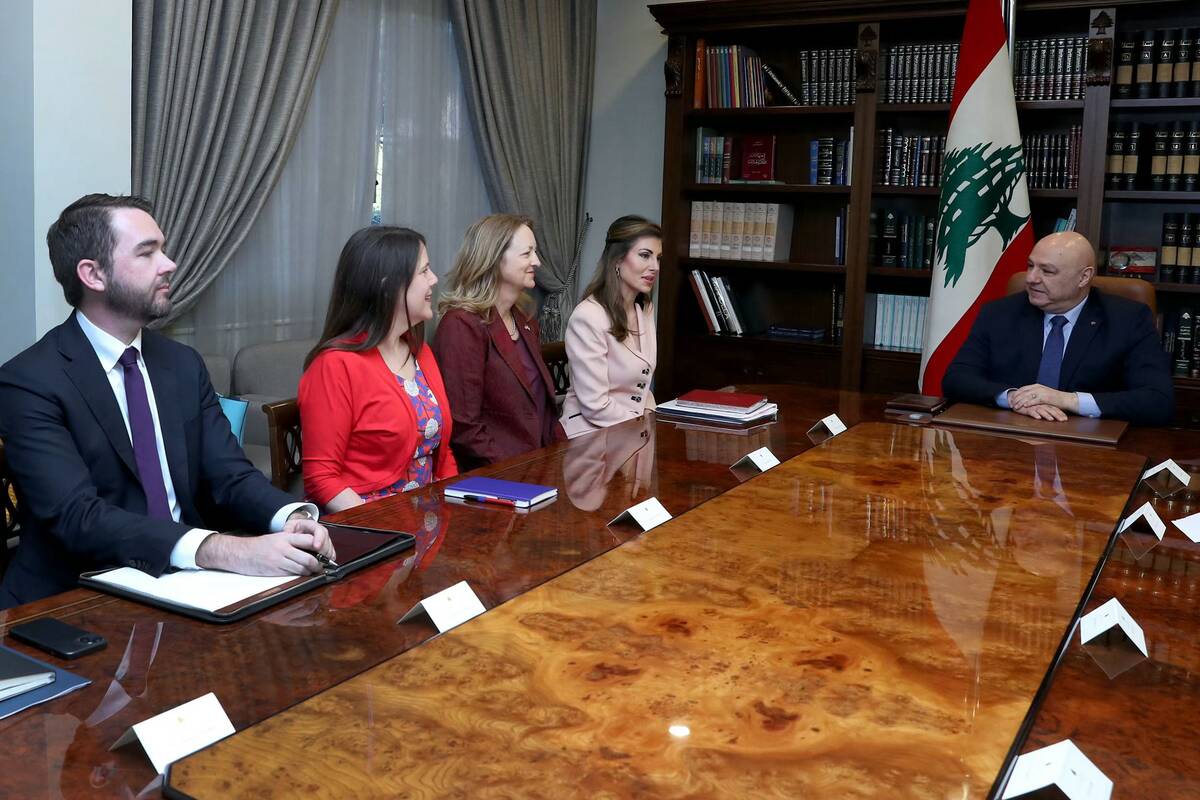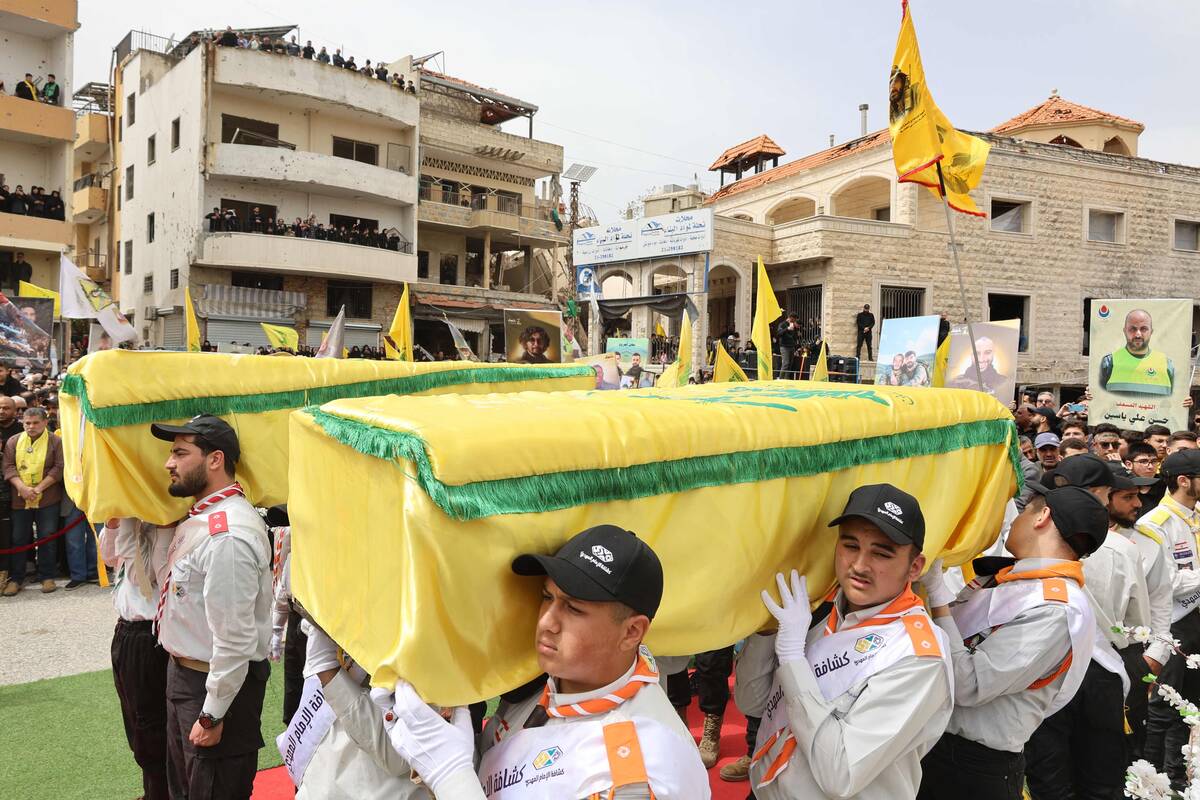BEIRUT: International diplomatic efforts to reach a ceasefire in Lebanon gathered pace on Saturday against a backdrop of destruction in southern border towns, the Bekaa, and Beirut’s southern suburbs.
Lebanese parliament speaker Nabih Berri received a phone call from French President Emmanuel Macron, while US presidential envoy to Lebanon Amos Hochstein called Prime Minister Najib Mikati to discuss the deadly Israel-Hezbollah confrontation.
Macron said that he is “making the necessary contacts” to prevent Israel from continuing its ground military operations, but said that “the Lebanese must take the necessary steps to cease fire, implement Resolution 1701, and quickly resolve the presidential election to reach a political and diplomatic solution,” according to Berri’s office.
Mikati’s media office said the discussion with Hochstein focused on “ways to achieve a ceasefire and stop the military confrontations between the Israeli army and Hezbollah in order to return to discussing a comprehensive political solution based on the implementation of Resolution 1701.”
US Secretary of State Antony Blinken called both Mikati and Berri on Friday. During a 40-minute conversation with Berri, they agreed on three points: “Committing to international resolutions, particularly Resolution 1701, preventing the expansion of the war, and reaching a diplomatic solution,” according to Berri’s office.
Political efforts to mitigate the losses Lebanon is suffering as a result of Israel’s war on Hezbollah are barely heard amid the noise of airstrikes, Israeli artillery, and the immense destruction in southern towns, the Bekaa, Beirut’s southern suburbs, and the cries of people who have lost everything and now find themselves in shelters or on the street.
A closed national meeting was held under the title “In Defense of Lebanon: Proposing a Rescue Roadmap” at the residence of the head of the Lebanese Forces Samir Geagea in Maarab. The meeting brought together Lebanese figures opposing Hezbollah’s ongoing war.
Geagea said the Lebanese people “deserve to live a dignified life free from the specter of wars. It is essential to restore the state amid the collapse of the structure over everyone’s heads and the dominance over the decision of war in Lebanon.”
He noted that “the accumulation of half-measures will not lead to solutions or stability without the establishment of a state.
“The international and Arab communities do not trust the current ruling system that is poised against the state.
“There is an urgent need to first achieve a ceasefire. We must proceed to elect a president who commits in advance to implementing international resolutions 1559, 1680, and 1701, as well as adhering to the provisions of the Taif Agreement.
“The elected president must ensure that the strategic decision-making authority resides solely with the state and grant the Lebanese Army all necessary powers.
“It is essential that the president is detached from all failed policies and is recognized for integrity and patriotism. Following this, binding parliamentary consultations should take place, leading to the election of a prime minister and the formation of a government.”
On Saturday afternoon, for the first time, the Israeli raids targeted the entrance to the town of Barja in the Iqlim Al-Kharoub and the main road of Nahr Ibrahim toward Qartaba in the Jbeil region in northern Lebanon. They also targeted the town of Deir Billa in the Batroun district.
Amid these developments, Hezbollah’s media relations official, Mohammed Afif, urged “against rushing to conclusions” regarding the political outcomes of the war.
“The struggle against the enemy is still in its early stages and the Israeli ground incursion into Lebanese territory will not be a picnic,” he said.
On Saturday, there were no further Israeli attacks on UNIFIL forces in the border area, in contrast to incidents over the previous two days that drew a wave of international condemnation. UNIFIL spokesperson Andrea Tenenti said “Israel is violating Resolution 1701 by targeting our forces.”
Meanwhile, Iran’s parliament speaker Mohammed Baqer Qalibaf arrived in Beirut after personally flying an Iranian aircraft to Rafic Hariri International Airport. Qalibaf said that his visit was made at the invitation of Berri, and that he brought “a message from the leader of the Islamic revolution, the president, and the Iranian people to the Lebanese people and the resistance.”
The Iranian official met Mikati and Berri, and inspected the site of the Israeli raid on the Basta area in the heart of Beirut, accompanied by a number of Hezbollah MPs.
He said: “We have always been on the side of the Lebanese people, their resistance and the Lebanese government. We extend our full assistance to the people and hope that they will be victorious. We will remain by their side in these challenging times. I will head from here to Geneva and I will carry with me the issues of the oppressed Lebanese and Palestinian peoples.”
However, the Iranian official heard from Mikati that “the government’s priorities at this stage are to work on a ceasefire, stop the Israeli aggression, preserve Lebanon’s security and the safety of its people, uphold Lebanon’s commitment to implementing Resolution 1701, strengthening the army’s presence in the southern region, and engage in necessary communications with influential countries and the UN to exert pressure on Israel for full compliance with the resolution.”
Israeli attacks continued on the south and Bekaa, while cautious calm prevailed in Beirut’s southern suburbs. The Israeli army claimed in a statement that “Hezbollah’s activities are forcing us to act against it.”
The Israeli army issued a new warning to the residents of 23 border towns and villages in the south to “evacuate and head north of the Awali River. It is forbidden to return to your homes until further notice.” Most residents of these towns left last year.
The most serious Israeli warning was directed at ambulances and Civil Defense vehicles, with the Israeli army claiming that “Hezbollah fighters are using them for transport.” The army warned that it would target the vehicles.
More than 25 devastating Israeli airstrikes were recorded on border towns, while Hezbollah reported “direct clashes with Israeli soldiers on the outskirts of the town of Dhayra, ambushing an Israeli force and blowing up an Israeli vehicle.”
The party counted “seven military operations carried out since dawn to counter incursion attempts.”
Lebanese Red Cross chief Georges Kettaneh said: “The movement of the Red Cross ambulances is carried out after informing the International Committee of the Red Cross and UNIFIL about our movements and missions, especially when traveling on the border, to ensure the protection of volunteers.”
In the Bekaa, the Israeli Air Force carried out airstrikes on Nabi Sheet, Saraain and Kfar Dan, killing one person and wounding three others. Two were wounded in Al-Kayyal, and four were killed in an airstrike on Boudai.
The Israeli army said that about 30 rockets were launched toward the Galilee panhandle. Israeli media reported “violent explosions” in the city of Safed, and others in Kiryat Shmona.
Hezbollah said it targeted “the occupied city of Tiberias with a salvo of rockets and targeted a military gathering on the outskirts of the town of Blida.”
It also targeted military gatherings in the Metula, Kfar Yuval, Khirbet Nafha, Kfar Giladi and Al-Manara settlements, and a communications base in Keren Naftali.
Hezbollah carried out a drone attack on Ein Margaliot, and another attack with assault drones on the air defense base in Kiryat Eliezer, west of Haifa.
Israeli airstrikes overshadow French-US ceasefire push in Lebanon
https://arab.news/9vqtj
Israeli airstrikes overshadow French-US ceasefire push in Lebanon

- Israeli planes target villages in Iqlim Al-Kharoub, and the districts of Jbeil and Batroun
- Hezbollah targets Safed, Tiberias, settlements and military bases with rocket, drone strikes
































